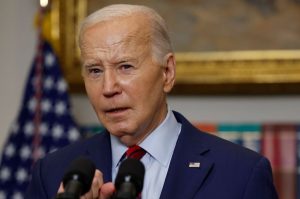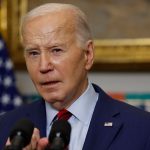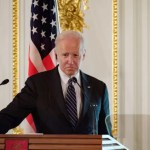Biden confronts the new politics of energy
Joe Biden upped the ante this morning. Heeding calls from lawmakers on the Hill, the president announced an import ban on Russian oil.
Americans are in favor. A recent survey found that 71 percent of voters back a ban, even if it means higher gas prices, as their views on the conflict harden.
But a population horrified by events in Ukraine that says it is willing to pay the price required to punish Putin is not the same thing as being forgiving to a president under whom they find themselves paying sky-high prices for gas. Biden knows that, branding the inevitable inflationary pressure as “Putin’s price hike” in his statement this morning. The Biden administration is still finding its feet with the tricky politics of a transformed energy landscape. In the last twenty-four hours, the administration has offered up glib solutions like transportation secretary Pete Buttigieg’s suggestion that if you don’t like the prices you’re paying at the pump, you should buy an electric vehicle. Kamala Harris delivered some bromides about the transition to green energy.
Meanwhile, Biden has launched a round of hurried petro-diplomacy. The White House has sent officials to Venezuela, where state-owned oil company PDVSA is, at present, sanctioned by the US government. The president himself is reported to be considering a visit to Saudi Arabia. The understandable ethical qualms one might have about such an approach hardly need to be spelled out. But the Biden administration presumably sees those as luxury opinions in the middle of what threatens to be the most serious energy shock in half a century. If only the White House applied the same logic elsewhere.
An administration willing to do business with brutal dictators to get the price of gas down gets awfully tetchy about the possibility that they can do anything to boost the domestic supply of energy. In yesterday’s White House press briefing, Jen Psaki was insistent that government regulations were no impediment to further domestic oil and gas production. The energy industry disputes that claim. Moreover, the administration’s claim is at odds with the insistence that it has set America on a path to net-zero emissions. Defenders of the White House approach say that the question of regulation on the domestic energy industry is a red herring because it would not bring fresh supply online right away. That misunderstands how markets work. Biden could stand up and promise a massive investment in nuclear power, a cessation to his moratorium on leases for drilling on federal land and an explicit pivot towards energy independence as a major policy priority. Is the argument really that that would have no effect on expectations of future energy supplies and, therefore, no impact on prices? He could get energy CEOs into the White House and say: “What do you need?” Instead, today, he warned them against “price gouging” and “taking advantage.”
Meanwhile, Democrats and their defenders in the press want to have it both ways: you cannot support Biden’s embargo and then blame him for high prices, they argue. But such an argument ignores the very real differences in energy policy between the two major parties. If Democrats doubt voters’ ability to recognize those differences, they are in for a nasty shock.
Biden said that the current crisis only underscores the need to transition to green energy in the long-run. Such an argument need not be at odds with an enthusiastic push to pump out as much energy as possible in the short- and medium-term. An all-of-the-above approach to energy is surely the answer: ramping up fracking, embracing nuclear, working with energy companies to ameliorate the current crisis.
“It’s simply not true that my administration is holding back energy production in this country,” said the man who campaigned on a ban on fracking on federal land. He boasted about “record oil production” in his speech this morning. A reminder of how quickly the world has changed. And an indicator of the tricky course Biden will have to steer in the coming weeks.
*** Sign up to receive the DC Diary in your inbox on weekdays ***
The myth of a ‘limited’ no-fly zone
This morning’s Politico Playbook brings exclusive news of a suggestion for what it calls a “limited no-fly zone” in Ukraine from “top foreign policy minds.” In an open letter, the group calls for “a limited no-fly zone over Ukraine starting with protection for humanitarian corridors” and says that, “NATO leaders should convey to Russian officials that they do not seek direct confrontation with Russian forces, but they must also make clear that they will not countenance Russian attacks on civilian areas.”
It might be possible to limit the geographical scope of a no-fly zone, but the seriousness of the commitment is inescapable. The enforcement of such a policy ineluctably involves being prepared to shoot down Russian aircraft. And so if, as Marco Rubio put it over the weekend, a more extensive no-fly zone means “World War Three,” so too does a “limited” alternative.
Russia’s alleged VOA spy
Was a Russian spy working for Voice of America? The government-funded broadcaster is “thoroughly reviewing” stories it published by Spanish freelance journalist Pablo Gonzalez after he was arrested at the Ukraine-Poland border by Polish authorities who suspect him of espionage. A Washington Free Beacon investigation finds that Gonzalez helped produce a VOA segment from Ukraine as recently as last month.
What you should be reading today
Matt Purple: Vladimir Putin, deep statist
Alexander Larman: When actors become politicians
Rupert Darwall: There is no climate crisis
Ben Judah, UnHerd: The Russia we have lost
Jennifer Schuessler, New York Times: Two leftist bros dive into conservatism in ‘Know Your Enemy’
Christopher Caldwell, American Affairs: Revisiting the collapse of the Soviet Union
Poll watch
President Biden Job Approval
Approve: 42.0 percent
Disapprove: 52.1 percent
Net approval: -10.1 (RCP Average)
What would Americans do if they were in the same position as Ukrainians?
All voters
Stay and fight: 55 percent
Leave the country: 38 percent
Republicans
Stay and fight: 68 percent
Leave the country: 25 percent
Democrats
Stay and fight: 40 percent
Leave the country: 52 percent (Quinnipiac)


















